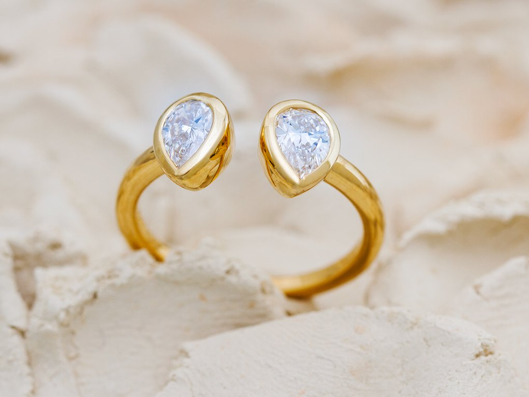@thesisgems for our next show date

Ethical Metalsmiths: Taking Responsibility for Every Piece Made
Posted on

Bridge diamond ring with Canadian pear diamonds and 18 karat reclaimed gold.
Do you know how many hands it takes to make a ring? This is the question posed (and answered) by Ethical Metalsmiths, a community of buyers, jewelers, designers, and suppliers vigilantly committed to ensuring every pair of hands that helps make a ring (or any piece of jewelry) uses ethical practices.
Thesis Gems is proud to become a member of Ethical Metalsmiths, continuing our journey toward social and environmental responsibility and joining a vibrant community of professionals who sharpen one another. Now we have even more knowledge and resources to draw from as we strive to deliver the most ethical jewelry possible to our customers.

Why We Joined the Ethical Metalsmiths Community
From mining and sourcing raw metals and gemstones to marketing and buying the finished product, jewelry passes through many hands. If we don’t use thoughtful practices at every step, people, animals, and the environment are put at risk. With education and activism, Ethical Metalsmiths is making sure communities and ecosystems are not only protected, but also nurtured and sustained.
At Thesis, we source our own gems, gold, and pearls, so we want to be as informed as possible. Ethical Metalsmiths is an incredible resource for data on the true impact of the gem industry on mining communities and the environment. The community also shares invaluable information on how to source ethical gold, non-toxic jewelry making, and organizations that give back to mining communities.

Sea of Cortez Semi Baroque Pearls, sourced from a sustainable saltwater pearl farm in Guyamas, Mexico.
How Jewelry is Made
Ethical Metalsmiths traces the journey of a piece of jewelry across eight touchpoints.
- The Gemstone Miner
Gemstone mining can be life-threatening work, and the long term effects on the environment can be devastating. Thankfully, passionate miners all over the world are adopting new practices and learning to make mining safer and more sustainable.
- The Metal Miner
Extracting gold and silver typically relies on toxic chemicals that pollute the environment. But alternative processes for precious metals can help us turn a new leaf.
- The Metal Refiner
Refiners processing raw gold and silver into pure metals face everything from burns and explosions to toxic dust. Greater transparency in metal refining practices can benefit workers and ecosystems.
- The Gem Cutter
Gem cutters make gemstones gleam and sparkle. Sadly, some gem cutters don’t have proper ventilation or safety measures in place, causing serious health problems. Through education and better worksite standards, these artisans can be protected.
- The Designer
Designing the finished product, or overall direction of a jewelry brand, designers are often responsible for sourcing their materials. This gives designers power to change the industry by choosing ethical gemstones and metals, just like we do at Thesis.
- The Maker
Using metalsmithing techniques, these individuals actually cast and forge the design. Toxic fumes, explosions, and burns are all potential threats in a metalsmith’s workplace. Ethical metalsmiths are choosing to use recycled and reclaimed materials and eco-friendly chemicals.
- The Retailer
From boutique, artisanal shops like Thesis, to department stores, retailers bring the finished piece direct to the collector. You might think the work is done before jewelry reaches the store, but retailers play a critical role: they can choose to sell only ethical jewelry and tell their customers why.
- The Collector
Finally, people like you also hold the power to transform the jewelry industry by shopping trusted retailers. Is there transparency into the ring or necklace’s journey? Were workers treated and paid fairly? Are mining environments properly protected and cared for? Don’t be afraid to ask.

Growing Better Together
Ethical Metalsmiths offers information and guidance for those of us who will never stop trying to do things better. As if this wasn’t enough, this community also led me to Christina Miller and Maggie Gabos, two new expert consultants helping Thesis become as robust and resilient as possible.
To learn more about how you can do your part as an ethical collector, reach out today. I would love to help you find a piece with a story worth telling.
Subscribe to our newsletter
News, Recent Collabs and Events. Directly to your inbox.
Contact
(510) 556-6443

